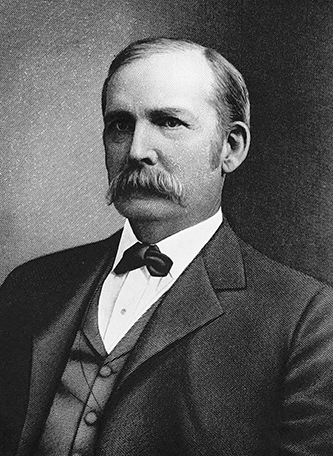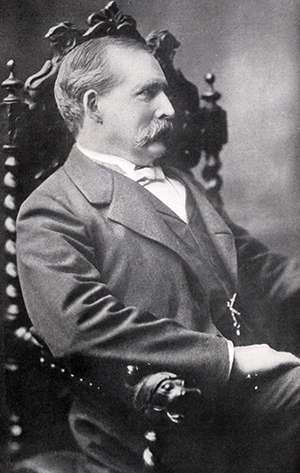11 Mar. 1832–26 Dec. 1919

William Ruffin Cox, lawyer, agriculturalist, Confederate general, congressman, and civic leader, was born in Scotland Neck, Halifax County, of English ancestry. His grandfather was John Cox. William's father was Thomas Cox; his mother, Olivia Norfleet. At the time of his death in 1836, Thomas Cox had three daughters and four sons, of whom William was the youngest.
William Ruffin Cox began his education in the Vine Hill Academy of Scotland Neck. After the death of Thomas Cox, Olivia Norfleet moved the family to Nashville, Tennessee, in order to be near her eldest daughter. There young Cox's education continued, as he prepared to enter Franklin College, where he graduated in 1850. After reading law at Lebanon College, he was admitted to the bar and practiced law for five years in Nashville as the partner of John C. Ferguson.
In 1857, upon his marriage to Penelope Battle, daughter of Edgecombe County planter James S. Battle, Cox returned to North Carolina and began to develop Penelo, the Edgecombe County plantation he retained all his life. He purchased Allen Hinton, an enslaved person, in 1857. He resettled in Raleigh in 1859 and opened a successful legal practice.
As an ardent proponent of slavery, Cox strongly supported secession. As preparation for military service he had studied military tactics; when war came, he organized and financed an artillery company. On 8 May 1861, Governor John W. Ellis appointed him to the rank of major in the Second North Carolina Regiment, launching him on a military career. Serving in the corps of Thomas J. ("Stonewall") Jackson and Richard Stoddert Ewell, he was successively promoted to lieutenant colonel (September 1862), colonel (March 1863), and, when he assumed command of Stephen D. Ramseur's old brigade, brigadier general (May 1864). Cox commanded a reorganized brigade of North Carolina troops, consisting of the First, Second, Third, Fourth, Fourteenth, and Thirtieth regiments. He fought in numerous battles and campaigns, including Malvern Hill, Antietam, Chancellorsville (where his regiment was so heavily engaged that half his men were killed or wounded), the Valley Campaign of 1864, and the defense of Petersburg. In the retreat to Appomattox, he led the last organized attack of the Army of Northern Virginia. Wounded eleven times, five at Chancellorsville, Cox emerged from the Civil War as a popular North Carolina military figure.

In 1865, Cox reopened his Raleigh law office. Soon thereafter he was elected president of the board of the Chatham Coal Fields Railway Company. His military reputation opened many possibilities, and he eventually turned to politics. He was considered at one time as a gubernatorial alternative to the Conservative candidate Jonathan Worth, but he did not accept nomination; instead, he sided with those who opposed congressional Reconstruction. In 1868 he stood for the temporarily important post of solicitor in the Raleigh district. He was elected by twenty-seven votes, although the Republican majority in the district was approximately four thousand. He was an able solicitor for the next six years. A delegate to the 1868 Democratic National Convention, he became increasingly active in party affairs. He succeeded Daniel M. Barringer as state Democratic chairman in 1874 and invigorated the party by emphasizing grassroots organization and rigid party discipline. He was instrumental in the Redemption Movement of North Carolina in the elections of 1874, 1875, and 1876. He was a viable candidate for governor in 1876 but withdrew. Zebulon Vance appointed Cox to the judgeship of the Sixth Judicial District of North Carolina, a position he filled until 1880.
Cox represented the Raleigh-Durham district in the Forty-seventh, Forty-eighth, and Forty-ninth Congresses (4 Mar. 1881–3 Mar. 1887). His most notable and controversial role came in the Forty-ninth Congress when, as chairman of the Committee on Civil Service, he championed reform. His views were generally unpopular among politicians who favored the old patronage system. In one speech to the House, Cox characterized a civil service system based on merit as "the genius and essence of democracy." This stand apparently caused his party to drop him from the ticket in 1886, although 197 convention ballots were required to nominate someone else. Cox declined President Grover Cleveland's offer of a post in the Land Office amid allegations, which he denied, that he was being rewarded for his defense of the civil service system. He was elected secretary to the U.S. Senate in 1893 and served in that capacity until his resignation in 1900, when he returned to North Carolina to stay. In his later years he resided at Penelo or Raleigh and engaged in agricultural pursuits.
Cox was actively involved in the civic affairs of his state. In the 1870s he was chairman of the North Carolina Education Association and was instrumental in founding the North Carolina Journal of Education, a monthly publication devoted to promoting the common schools. Long a member of the executive committee of the North Carolina Agriculture Society, he became president in 1900. He was grand master of North Carolina Masons in 1878 and 1879 and a layman in the Protestant Episcopal church, attending diocesan conventions and serving as trustee of the University of the South.
In 1857, Cox married Penelope Battle; their only child, Pierre B., died in early manhood. In 1883 Cox was married to Frances Augusta Lyman; their union produced two sons, Albert L. and Francis. In 1905, Cox married Herbert A. Claiborne of Richmond, Va. He died at Richmond and was buried in Raleigh's Oakwood Cemetery, attended by Confederate veterans and by Masons.